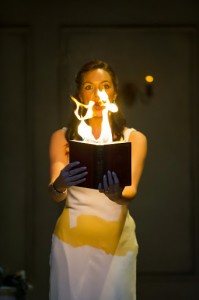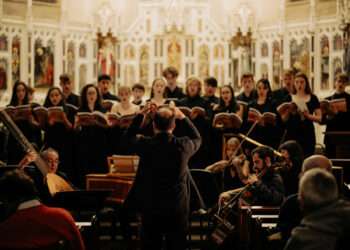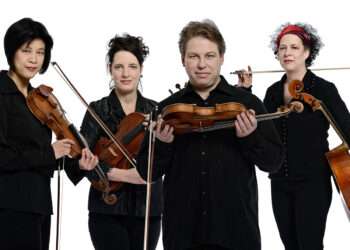
It’s easy to think that we know the story of Jason – it’s a standard in every child’s book of Greek Myths, the hero who overcomes impossible challenges to claim the prize of the Golden Fleece, helped by the lovely witch-princess Medea who has conveniently fallen in love with him. There’s not much of this in Cavalli’s opera though – pretty much the only recognisable incident from the children’s books, Jason’s defeat of the monster that guards the fleece, is reduced to a minute or so of splendidly percussive strings (Combattimento), the quest a mere distraction to the far more adult pursuits that occupy the rest of the story. Jason’s first appearance in the opera is decidedly unheroic, as he staggers, sated, from Medea’s bed, into the morning sun, and is berated by Hercules for having gone soft and abandoned his duties.
The opera’s libretto is long and tortuous, and Cavalli’s complete score adds up to nearly four hours of music, but Jason (Giasone in the original Italian) was one of the most popular operas of 17th century Venice. We might think they had more stamina than us, but 17th century theatre-going conventions meant that the audience weren’t obliged to sit quietly and concentrate, and I like to imagine them taking sides and gossiping about the sprawling soap-opera plot as it unfurled before their eyes. Ted Huffman’s production for English Touring Opera, based on Ronald Eyre’s already abbreviated 1984 version for Buxton opera cuts Jason down to a size far more palatable to the modern audience – to quote ETO’s press officer, it’s more of an enjoyable jaunt than a marathon.
The prologue, a dialogue between Apollo (the sun) and Cupid (love) gives us a pretty good idea of the general set-up. Jason has left behind a wife, Isiphile, and twin sons, but on arriving in Colchis, he has been distracted by Medea. Apollo approves, because Medea is descended from him, but Cupid is miffed that he hasn’t been consulted, and that Jason is breaking the bonds of marital love. Isiphile has her own suspicions and has sent her spy Orestes to keep an eye on Jason. The high rhetoric of the prologue soon gives way to a tangled web of relationships, with all the supporting characters playing their own games on the side of the central triangle, sometimes comic, sometimes tragic.
The opera’s composer Cavalli has mostly fallen into obscurity, despite his importance in the development of opera. He was born in Cremona in 1602, and began his musical career in Venice as a boy in the choir of St Mark’s, under Monteverdi’s direction, then as a tenor, before working his way up through the hierarchy of organist positions to become maestro di cappella, so in addition to his many operas he also wrote plenty of church music: in fact the first I heard of his music was his sunny Salve Regina on The Sixteen’s “Venetian Treasures” album.
The influence of Monteverdi is evident in Jason although Cavalli’s operatic music for the most part feels more down-to-earth than the rarefied atmosphere of Monteverdi. His orchestral writing is vibrant and there are some deliciously florid recorder parts. I’ve picked out a few tracks that caught my ear from the Federico Maria Sardelli recording on Spotify (there are only two recordings on Spotify, and the other, by Rene Jacobs has a couple of tracks unavailable). The translations come from the online libretto of Sardelli’s recording.
Jason – Delizie, contenti
Delight, happiness, that fill my soul to the brim, stop, cease: stop pouring into my heart the joys of love. Delights, cease: I can yearn for nothing more, I have had enough. In love’s lap, in sweet fetters I long to die; a murderous fondness leads me to die.
Jason’s first aria, as he drags himself away from the delights of Medea’s bed. The music matches the words – what more do I need to say?
Medea – Dell’antro magico
Screeching hinges of the magic den, open up a passage for me, and let me into the darkness of the dim retreat. Over the dreadful altar of the Stygian swamp let fires glow, and may they wrap me in smoke dense enough to veil the light of the sun.
The image of Medea the witch-princess summoning up the dark forces of the underworld to do her bidding gives composers a good excuse to unleash their own dramatic powers (I’m thinking here of Medea’s insanity in Charpentier’s Medée) and Cavalli has his own fun with this scene. Drumbeats herald sinister string chords, low in the register as the singer – naturally, a mezzo – begins slow, ascending chant. It’s magnificent.
Isiphile – Oreste ancor non giunge
Orestes is not coming, and every minute my torment grows more bitter, stings my heart. Go, my faithful maid, go to the nearby harbour, ask every mariner there whether Orestes has returned from Colchis; I shall remain in dreadful solitude with my sorrow as companion.
Isiphile makes her first appearance plunged in gloom, fretting about whether her spy Orestes will bring news of Jason, but is soon cheered up by the irrepressibly cheerful Alinda.
Alinda – Gradite tempeste
Welcome storm, dear tempest, you have washed ashore most appreciated goods!
Because of you I rejoice your wrath has brought here such plenty. So many soldiers; be merry, be merry, loving women.
Jason and his men have returned to Jason’s home in Lemnos, where his wife’s maid Alinda is delighted at the arrival of soliders and flirts shamelessly with Besso, her merriment bringing the second act of the full version to a joyously comic close.
Alinda – Gradite tempeste
Welcome storm, dear tempest, you have washed ashore most appreciated goods!
Because of you I rejoice your wrath has brought here such plenty. So many soldiers; be merry, be merry, loving women.
Jason and his men have returned to Jason’s home in Lemnos, where his wife’s maid Alinda is delighted at the arrival of soliders and flirts shamelessly with Besso, her merriment bringing the second act of the full version to a joyously comic close.
Demo – Gioite, gioite
Rejoice, be happy, my loving heart; Soar to the skies, banish the clouds the horror of pain and sorrow. From the kingdom of love shower onto me sweet blessings; my loving heart rejoice.
A short and sweet aria, with some exuberant recorder playing. (I had to include one bit with recorders of course).
It all looks immensely fun and ETO’s production is getting great reviews – catch it at the Gala Theatre, Durham on 5 November – details here







